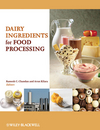Yogurt from Dairy Alternatives
Food scientists announced the development of a yogurt alternative made with plant “milks” instead of cow’s milk.

The “milks” used in the creation of the yogurt were extracted from almonds, oats and hazelnuts. In a statement, the team said they plan to evaluate walnuts and chestnuts for use in the yogurt alternative.
“The results we have obtained also show that the ‘milks’ studied are a good matrix for the growth and viability of probiotic bacteria for the lifetime of the product, especially after their intake,” said Chelo González, a researcher at UPV.
Through in vitro studies, the Spanish team was able to demonstrate how some of their novel products increase the bioavailability of iron and have an anti-inflammatory effect on intestine cells, which could lighten allergic reactions caused by food. Besides being a serious allergen, the caseins of cow’s milk disrupt the body’s absorption of iron.
The Spanish team said their work provided new clues to advance the use of commercially available plant-based “milks,” which have deficiencies such as low physical integrity during storage. “Overall, the project results contribute to increase knowledge about the nutritional and health properties of vegetable milks, in view of future industrial applications to develop innovative quality products suitable both for the general public and for specific groups,” González said.
Plant-derived milks have been growing in popularity over the past few years and market research company IBIS World has estimated that soy and almond milk alone generate nearly $140 million in revenue annually.
Rodger Ringwood, company director for Almond Breeze, told the Australian Broadcasting Company that two things are behind the growth in popularity. “Taste and health,” he said.
“Health means different things to different people, the milk alternatives generally, and certainly almond milks are very low in fat -- a lot of people are talking about this term super food these days, but almonds are very much a superfood,” Ringwood explained.
“The health values of almond milk, and other milks as well, are driven by factors such as being dairy free; for people who have got issues with lactose, maybe avoiding eggs, gluten, looking for something low GI, low fat, and also looking for a good source of calcium or vitamin E,” he added.
Plant “milks” are considered to have a healthy profile of fatty acids and carbohydrates. They can also be a substantial source of vitamins B and E, antioxidant compounds and dietary fiber. These milk alternatives are also high in potassium and low in sodium, allowing for a healthy balance of electrolytes.
González noted that these milks are particularly nutritious for pregnant women due to a high folic acid content and good calcium to phosphorus ratio.
“This last property, together with the absence of lactose, milk protein and gluten, are what make these drinks good substitutes for cow’s milk,” she said.
Looking for a reprint of this article?
From high-res PDFs to custom plaques, order your copy today!






